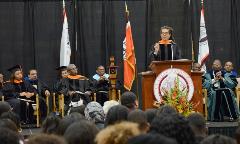Finney Urges 145th Founders’ Day Convocation Audience to Continue Work of Founding Fathers, Mothers
Nov 23, 2014
 Famed poet, author and educator Nikky Finney encouraged the audience to not forget their own personal founders and to choose carefully among the voices in their lives during her 145th Founders’ Day Convocation address Sunday afternoon at Claflin University.
Famed poet, author and educator Nikky Finney encouraged the audience to not forget their own personal founders and to choose carefully among the voices in their lives during her 145th Founders’ Day Convocation address Sunday afternoon at Claflin University.
The Founders’ Day Convocation is held each year to commemorate the establishment of the University. It is annually the culminating activity for Homecoming Week at Claflin.
Using mountains as the running metaphor of her address, Finney said it is imperative to keep reaching for the summit of your own life.
“Mountains are a part of the great design of the Earth,” Finney told those gathered in Tullis Arena of the Jonas T. Kennedy Health and Physical Education Center. “Scientists tell us that without mountains being uplifted, all land would eventually be blown away into the sea and there would be no dry ground on which to stand and live. So mountains are important.”
Finney – daughter of the honorable former South Carolina Supreme Court Justice Ernest A. Finney and educator Frances Davenport Finney, both Claflin graduates – pointed to the people in her own life who encouraged her to be herself and step out on faith.
When she was young, family members warned Finney “to be careful with my little black girl imagination and young writer imagination because they always said I was making a mountain out of a molehill. I’m still making mountains out of molehills. That’s what I do as a writer.”
Sharing a passage from Langston Hughes’ 1926 essay, “The Negro Artist and the Racial Mountain,” Finney said it was life-changing for her as a 19-year-old sophomore at Talladega College in Alabama and aspiring writer to hear how important it was for black writers and artists to do and think and say what they had to do and write and say.
“I needed permission to be my whole self,” she said. “I needed to be conscious of my own actions, and I needed to realize that I was participating in a great tradition of standing up for the truth in my own heart.
“You need things to hold onto while you are figuring out who you are. There are some black writers and some black historians and some black founders whose words become both anchor and sailboat.”
Growing up, Finney said she paid attention to landscapes and the stories that surrounded her. And she drew inspiration from those in her family and community.
“Those are my founders. … Every one of us has people in our lives we could call founders,” she said. “All these dark, sweet ones who had deep feelings of personal and communal satisfaction in their lives and were rooted in a lifelong principle, ethical survival in spite of the unfair weight of the empire called America that had never really done right by them. … People who clearly understood what a mountain was, and knew one of their paths every day was to keep their eyes on the summit.”
People, she said, who warned her to watch out for those who spoke sweetly but never told the truth.
“Your job, Claflin students, every day you matriculate, is to find out who in your life is handing you a dead language or a living language – who is speaking to you positive things, or who is closing doors in your face,” Finney said. “I did not grow up in a community that taught me that I should want to be king or queen of any mountain. I grew up in a community that taught me that love was an action, that everybody had a right to the view from the precious and high summit.
“If we are to continue the work of the founding fathers and mothers of Claflin and of ourselves, to get to the summit, our individual summit and Claflin’s summit, we must bring all of the good work from the past forward on our shoulders … and, in the Harriet Tubman way, you have got to reach back and grab somebody and bring them with you.”
Receiving this year’s Bythewood Award, which recognizes an individual’s outstanding and extraordinary contributions to the University and the community, was Dr. Vermelle J. Johnson, who, during her long, illustrious career in education, served Claflin twice as its chief academic officer and recently completed Torchbearers, The First Ladies of Claflin University, a seminal history of the eight first ladies of the University. Receiving Presidential Citations were alumni Winston Wingo and Clyde Bess, as well as all Claflin University alumni for their contributions and support of the University.
Also at Founders’ Day, the University releases its Founders’ Day Report, which highlights financial gifts of $100 or more to Claflin from January 1 to October 15. Gifts during this period totaled more than $5 million.
“Today, Claflin University is on an upward trajectory,” President Henry N. Tisdale said. “We have made significant achievements. We have much to celebrate, and will continue to strive for excellence in all that we do.”